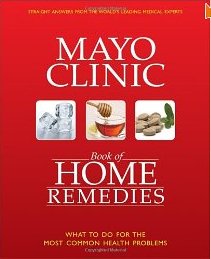Book Review: The Mayo Clinic Book Of Home Remedies
 I write a lot of critical articles. It’s nice to be able to write a positive one for a change. I received a prepublication proof of The Mayo Clinic Book of Home Remedies: What to Do for the Most Common Health Problems. It is due to be released on October 26 and can be pre-ordered from Amazon.com. Since “quackademic” medicine is infiltrating our best institutions and organizations, I wasn’t sure I could trust even the prestigious Mayo Clinic. I was expecting some questionable recommendations for complementary and alternative medicine (CAM) treatments, but I found nothing in the book that I could seriously object to.
I write a lot of critical articles. It’s nice to be able to write a positive one for a change. I received a prepublication proof of The Mayo Clinic Book of Home Remedies: What to Do for the Most Common Health Problems. It is due to be released on October 26 and can be pre-ordered from Amazon.com. Since “quackademic” medicine is infiltrating our best institutions and organizations, I wasn’t sure I could trust even the prestigious Mayo Clinic. I was expecting some questionable recommendations for complementary and alternative medicine (CAM) treatments, but I found nothing in the book that I could seriously object to.
It is organized alphabetically, starting with acne and airplane ear and progressing through bedbugs, boils and bronchitis, dandruff, depression and diabetes to warts, wrinkles and wrist pain. Each entry consists of (1) a description of the problem and its symptoms, (2) treatments you can try at home, and (3) when to seek professional medical help. It concludes with a short section on emergency medicine that covers anaphylaxis, bleeding, burns, CPR, choking, fracture, heart attack, poisoning, seizure, shock and stroke.
Nowhere does it mention acupuncture, chiropractic, energy medicine, or homeopathy. It gives good, clear guidance about when a health problem should not be treated with home remedies. Its recommendations about diet and exercise are solid. It doesn’t recommend anything that can’t be supported by published studies and common sense. When it recommends herbal remedies and dietary supplements, it is cautious about what it claims. For instance, glucosamine and chondroitin are listed for osteoarthritis, but they point out that further study is required and they say “because the supplements may help and appear to be safe, it may not hurt to give them a try.” Not exactly a strong recommendation. Read more »
*This blog post was originally published at Science-Based Medicine*











